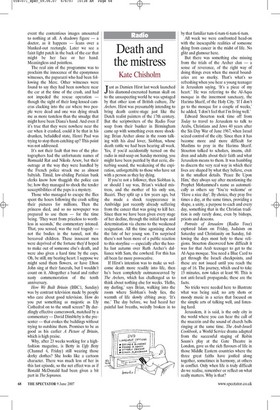Death and the mistress
Kate Chisholm Just as Damien Hirst last week launched his diamond-encrusted human skull on to the unsuspecting world he was upstaged by that other icon of British culture, The Archers. Hirst was presumably intending to bring death centre-stage just like the Dutch realist painters of the 17th century. But the scriptwriters of the Radio Four soap from their bunker in Birmingham came up with something even more shocking: Brian Archer alone in the room talking with his dead lover, Siobhan, whose death rattle we had been hearing all week. Yes, if you'd accidentally turned on the radio in mid-soap on Sunday morning, you might have been puzzled by that eerie, disturbing sound, the weakening of the expiration, unforgettable to those who have sat with a person as they lay dying.
If you're not a follower, then Siobhan is, or should I say was, Brian's wicked mistress, and the mother of his only son, Ruairi. They split up a few years ago, but she made a shock reappearance in Ambridge just recently already suffering from the cancer that was going to kill her. Since then we have been given every stage of her decline, through the initial hope and determination via chemo to the weakened resignation. All the time agonising about the fate of her young son. I'm surprised there's not been more of a public reaction to this storyline — especially after the hooha last autumn over Ruth Archer's dalliance with Sam, the cowherd. For this has all been far more provocative.
If Hirst's intention was to make us welcome death more readily into life, then he's been completely outmanoeuvred by The Archers, which has challenged us to think about nothing else for weeks. 'Hello, my darling,' says Brian, walking into the room where Siobhan's body lies, the warmth of life slowly ebbing away. 'It's me.' The day before, we had heard her painful last breaths, weirdly broken in to by that familiar tum-ti-tum-ti-tum-ti-tum.
All week we were confronted head-on with the inescapable realities of someone dying from cancer in the midst of life. No glitz and glamour here.
But there was something else missing from the trials of the Archer clan — a sense of reverence, of the right way of doing things even when the moral boundaries are so murky. That's what's so refreshing when you hear a young teenager in Jerusalem saying, 'It's a piece of my heart.' He was referring to the Al-Aqsa mosque in the innermost sanctuary, the Harima Sharif, of the Holy City. 'If I don't go to the mosque for a couple of weeks,' he added, 'I don't feel that I'm living well.'
Edward Stourton took time off from Today to travel to Jerusalem to talk to Arabs, Christians and Jews 40 years after the Six-Day War of June 1967, when Israel seized control of the city. Since then it has become more and more difficult for Muslims to pray in the Harima Sharif. Stourton talked to scholars, imams, children and adults about their faith and what Jerusalem means to them. It was humbling to discern the very real way in which their lives are shaped by what they believe, even in the smallest details. 'Peace Be Upon Him,' they always say after mentioning the Prophet Mohammed's name as automatically as others say 'You're welcome' or 'Have a nice day'. By choice, they pray five times a day, at the same times, providing a shape, a unity, a purpose to each and every day, something that in the Christian tradition is only rarely done, even by bishops, priests and deacons.
Portraits of Jerusalem (Radio Four) explored Islam on Friday, Judaism on Saturday and Christianity on Sunday, following the days most holy to these religions. Stourton discovered how difficult it was for that Arab teenager to get to the Al-Aqsa mosque. You need a Blue Card to get through the Israeli checkpoints, and these are not issued until you reach the age of 16. The journey, which used to take 15 minutes, now takes at least 90. This is not anti-Israeli propaganda; these are the facts.
No tricks were needed here to illustrate what was being said; no arty shots or moody music in a series that focused on the simple arts of talking well, and listening hard.
Jerusalem, it is said, is the only city in the world where you can hear the call of the muezzin and the sound of church bells ringing at the same time. The Arab-Israeli Cookbook, a World Service drama adapted from the successful staging of Robin Soans's play at the Gate Theatre in London, gave us the rich flavours of life in those Middle Eastern countries where the three great faiths have jostled along together, sometimes in harmony, at others in conflict. Only when life is truly difficult do we realise, remember or reflect on what really matters. Why is that?




























































 Previous page
Previous page